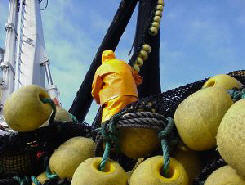|
Fishing companies take subsidy battle to WTO
Peru says that overexploitation by other countries is
exhausting its fishery resources.
Photo © O Hjellestad
ARGENTINA
12th February 2003
Argentina, Chile and Peru are adding their weight to the Friends of Fish campaign to stamp out fishing subsidies, which they claim "impoverish the seas and distort commerce," reports EFE.
The Friends of Fish group of countries, including Norway, Iceland and New Zealand, has been pushing for subsidies to be classified according to detailed inventories and wants a study on the impact of the different support schemes to determine which of them violate multilateral commerce rules.
Meanwhile, Argentina, Chile and Peru have voiced their concerns at the World Trade Organisation (WTO), in Geneva, on 7 February.
Prior to the talks in Geneva, various fishing industry organisations - including Calapa, Capip, Cepa and Capca - represented their members at a meeting with government officials to analyse the drawbacks of fishing subsidies applied by countries that buy Argentine products, which do not receive any financial aid.
The fishing companies argue that their activities are subject to various fees and taxes but they don't receive any subsidies on their exports, while in other countries, companies that perform the same activities, and import products caught in Argentine waters, did receive subsidies, reports Thefishmall.com.
Having agreed on the need to establish joint policies and actions with other countries that want to eliminate subsidies that "create a competitive disadvantage," the proposal was presented to WTO authorities.
During the Geneva talks, Chile, which has already faced several international antidumping accusations, stressed that despite having a 4,000 kilometre coastline, the country cannot compete with subsidised fleets.
Peru added that overexploitation by other countries is exhausting its fishery resources.
And the US delegate concluded that any subsidy scheme "that artificially reduces prices or increases income is effectively distorting commerce."
By Patricia Diácono
FIS Latino
Top
|
